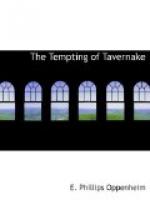“More weapons, indeed,” he repeated. “Elizabeth, what a gift— what a gift!”
“You speak,” she replied, “as though it were an evil one.”
“I was only thinking,” he said, “that it seems a pity. You are so wonderful, we might have found an easier and a less dangerous way to fortune.”
She smiled.
“The Bohemian blood in me, I suppose,” she remarked. “The crooked ways attract, you know, when one has been brought up as I was.”
“Your poor mother had no love for them,” he reminded her.
“Beatrice has inherited everything that belonged to my mother. I am your own daughter, father. You ought to be proud of me. But there, I gave you another commission. Is it true that Jerry is really here?”
“He arrived in England on Wednesday on the Lusitania. He has been in town all the time since.”
A distinct frown darkened her face.
“He must have had my letter, then,” she murmured, half to herself.
“Without a doubt,” her father admitted. “Elizabeth, why do you take chances about seeing this man? He was fond of you in New York, I know, but then he was fond of his brother, too. He may not believe your story. It may be dangerous.”
She smiled.
“I think I can convince Jerry Gardner of anything I choose to tell him,” she said. “Besides, it is absolutely necessary that I have some information about Wenham’s affairs. He must have a great deal more money somewhere and I must find out how we are to get at it.”
The professor shook his head.
“I don’t like it,” he muttered. “Supposing he finds Beatrice!”
Elizabeth shrugged her shoulders.
“Beatrice is made of silent stuff,” she declared. “I should never be afraid of her. All the same, I wish I could find out just where she is. It would look better if we were living together.”
The professor shook his head sadly.
“She left us of her own free will,” he said, “and I don’t believe, Elizabeth, that she would ever come back again. She knew very well what she was doing. She knew that our views of life were not hers. She didn’t know half but she knew enough. You were quite right in what you said just now; Beatrice was more like her mother, and her mother was a good woman.”
“Really!” Elizabeth remarked, insolently.
“Don’t answer like that,” he blustered, striking the table. “She was your mother, too.”
The woman’s face was inscrutable, hard, and flawless behind the little cloud of tobacco smoke. The man began to tremble once more. Every time he ventured to assert himself, a single look from her was sufficient to quell him.
“Elizabeth,” he muttered, “you haven’t a heart, you haven’t a soul, you haven’t a conscience. I wonder—what sort of a woman you are!”
“I am your daughter,” she reminded him, pleasantly.
“I was never quite so bad as that,” he went on, taking a large silk handkerchief from his pocket and dabbing his forehead. “I had to live and times were hard. I have cheated the public, perhaps. I haven’t been above playing at cards a little cleverly, or making something where I could out of the weaker men. But, Elizabeth, I am afraid of you.”




